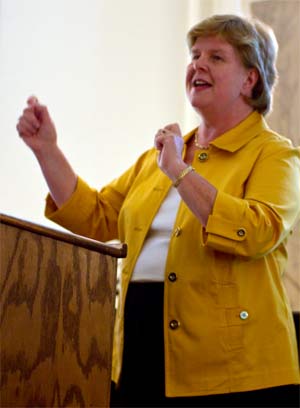Romer offers young academics solace, sense and secrets
Economics professor and White House insider Christina Romer shared stories of academic life and public service during an hourlong talk at the Women's Faculty Club.
October 11, 2011
In the fall of 2008, Christina Romer, a UC Berkeley economics professor with no government or policymaking experience, got an unexpected phone call from a member of President-elect Barack Obama’s inner circle.
“The Fed is out of bullets,” said the voice on the other end of the line, “and we need to start looking at alternatives.”
Romer, who chaired the White House Council of Economic Advisers for some 20 months before stepping down in September 2010 to return to Berkeley, shared the anecdote during an hourlong talk at the Women’s Faculty Club Thursday.
Speaking to an attentive audience of some 75 faculty and students, Romer, a recipient of Berkeley’s Distinguished Teaching Award in 1994, offered her perspective on academic life, government service and work-family balance.
In 2008, with the flatlining economy in need of a massive fiscal jump-start, the Obama transition team turned to UC Berkeley professor Romer to draft the plan. Many credit the resulting $800 billion American Recovery and Reinvestment Act of 2009, co-authored by Romer, with preventing the United States from sliding into a second Great Depression.
Months later, in passing, Romer asked then-White House Chief of Staff Rahm Emanuel why the Obama team had called on her, instead of an economist with a policy background.
“You’re an expert on the Great Depression, and we really thought we might need one,” said Emanuel.
With a doctorate from M.I.T., Romer began her teaching career at Princeton before joining the faculty at Berkeley in 1988. She is married to David Romer, an economist and professor of political economy at Berkeley.

Romer’s talk launched this year’s WFC Academic Lives Program. (Nyx Robey photo)
During her talk, Romer touched on the inherent early-career quandary faced by many young faculty, and paid tribute to the support for innovative research over publishing quotas that remains a hallmark of the campus.
“What I always loved about Berkeley was that it encouraged us to swing for the fences and try to hit the home run,” Romer said. “That was liberating and also terrifying because it made you wonder whether you had a home run in you, but it at least got us to try.”
Romer, who also serves as co-director at the National Bureau of Economic Research, contrasted the demands, rewards and trade-offs she experienced in academia and public service. The Garff B. Wilson professor of economics emphasized the importance of connecting with a more senior faculty-mentor who can help navigate early career development.
“Think about more than just the USA Today ranking of a department,” Romer urged. “So much is about where will you feel nurtured and where will you have that intellectual excitement that will actually allow you do well.”
Thursday’s event, jointly sponsored by the Association of Academic Women and the Division of Equity and Inclusion Faculty Mentoring Program, launched the fourth year of the Academic Lives Program. The WFC program is designed to offer faculty and students diverse insights on personal, professional and public issues associated with different career paths.
“David and I used to joke that as a professor you can work any 60 hours you want—it’s hard, you work a lot, but you do have flexibility, and there are very few jobs where you can have that,” Romer said.
A mother of three children, Romer recalled her own time as a junior member of faculty struggling to juggle career and family and imparted some words of comfort to her young colleagues and aspiring academics seated in the audience.
“I see women and men in my department today who have new babies, how strung-out they are, and I remember how exhausted and stressed I used to feel,” Romer said. “I just tell them it will get better, some day you’ll look back on this fondly.
“Not that any of them believe me, of course.”